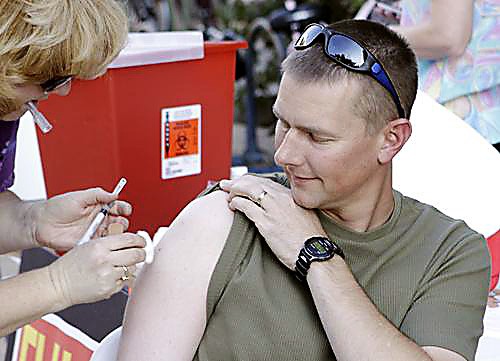UA students have been spending fall with comfortable weather and pumpkin spice lattes, but an old enemy has made its return: the flu.
Flu season has already started and may not be gone until spring.
Dr. Sean Elliott, medical director of infection prevention for the UA Health Network, said flu cases start in early October and last through March or April. Elliott said the flu is common during colder months because it grows at a certain temperature.
When the air gets drier in colder months, so do people’s noses and throats, which allows the virus to get in through the “dried out cracks” in those areas, Elliott added.
“Part of it has to do with the temperature of your nasal cavities,” Elliott said. “The flu virus has a temperature it grows at, and during the winter months, it grows beautifully in the back of the throat.”
Amy Direnfeld, an immunization nurse at UA Campus Health Service, said students should get the flu shot between now and the beginning of November. Campus Health Service provides the vaccine for students, staff and faculty.
“You can simply walk in to ‘immunizations’ at any of the walk-in hours with your CatCard and your health insurance card,” Direnfield said. “If you don’t have that, we’re happy to put it on your bursar’s.”
There are different strains of the flu, meaning people can get it multiple times in one season, Elliott said.
“If a student already has one episode of the flu, they should still get the vaccine,” Elliott said. “The good thing is the vaccine, which is produced every year, is geared to protect [against] the flus that will occur that season.”
According to Elliott, predicting the flu that will be most prevalent each season is similar to forecasting the weather. The World Health Organization and the Centers for Disease Control and Prevention work together to test and see which vaccination is appropriate each year, Elliott added.
Gabrielle Bruggeman, a veterinary sciences junior, said she has a flu season plan that she sticks to.
“I’m scared of needles,” she said. “During the flu season I don’t get the vaccine, but I wash my hands after coming into contact with people, and I make sure not to kiss anyone who’s sick.”
Unlike Bruggeman, Andrea Wheeler, a graduate student studying public health, said she makes sure she gets the shot.
“I got the H1N1 vaccine for free as an undergrad,” Wheeler said. “Since students live in dense populations, like dorms and stuff, it’s important to get vaccinated. This is supposed to be a really bad flu season.”
Elliott said vaccination is key, and students should get the shot or the flu mist, an inhaled vaccine.
“Number one: Get the flu shot,” Elliott said. “Just get some sort of flu vaccine.”
There are other steps students can follow to prevent getting the flu, such as practicing good hygiene and staying well-rested, Elliott added.
“Wash your hands — a lot. Practice cough etiquette — just to keep the infected droplets from getting out into the air [or else] someone else could inhale them,” Elliott said. “The other thing is to get as much sleep as possible. Try to get sleep; keep the body active. Have good total body health.”









